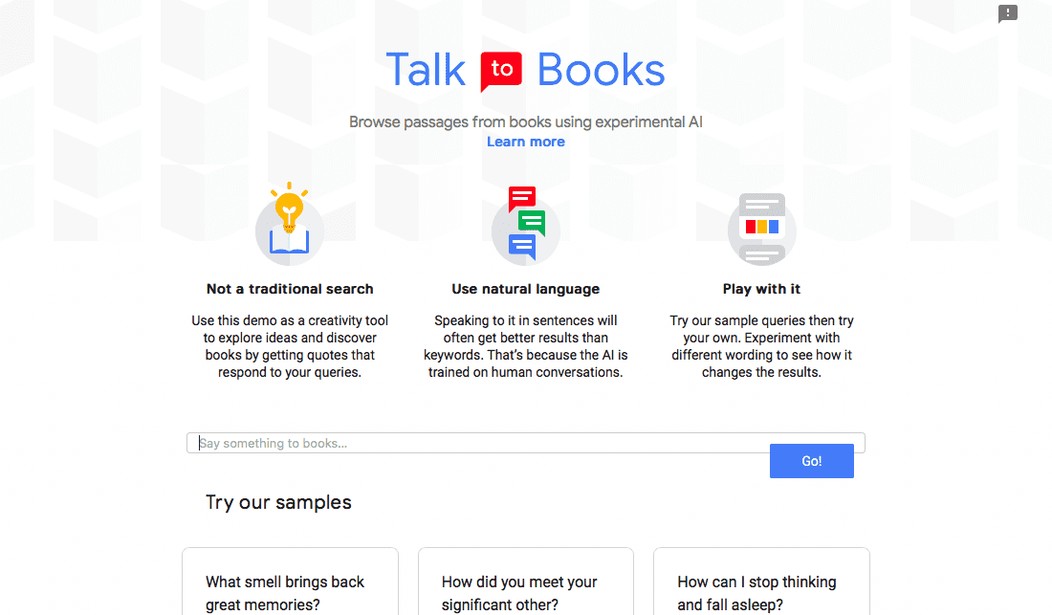Google’s artificial intelligence (AI) program has launched three “semantic experiences,” allowing people to glimpse a computer’s ability to understand how language works. One of these programs, “Talk to Books,” aims to let users carry on a conversation with a library of 10,000 volumes.
“How does a computer understand you when you talk to it using everyday language?” asks Google’s “semantic experiences” page. “Our approach was to use billions of lines of dialogue to teach an AI how real human conversations flow.”
Once the AI has processed this huge amount of data, “it is then able to predict how likely one statement would follow another as a response.” Google launched demos in which “the AI is simply considering what you type to be an opening statement and looking across a pool of many possible responses to find the ones that would most likely follow.”
The idea of artificial intelligence “learning” language would strike most people as odd, to say the least. To achieve this feat, Google uses “machine learning,” defined as “a program or system that builds (trains) a predictive model from input data.”
Talk to Books allows a user to start a conversation, and the AI will build on the opening statement, using passages from over 100,000 books. Users can either start with a statement or a question, and Talk to Books will present a natural next step. The response appears in bold, but it also appears in the context of a passage.
If a user asks the program, “Is artificial intelligence possible?” the program responds, “The question ‘what is artificial intelligence?’ is not easy to answer.” The second answer may fit better: “The answer depends pretty much upon what you mean by artificial intelligence.”

Google screenshot of the program “Talk to Books” answering whether or not artificial intelligence is possible.
“If you could travel anywhere, where would you travel?” brings a rather compelling answer. “To Greece, to sleep one night in a luxury hotel on the top of Mount Olympus, so one will be able to say that one has been there; and then onward to the Bosporus, to rest for a few hours on the site of Byzantium.”
“If you could wish for anything, what would it be?” yields a simple and compelling answer: “I wish my family happiness and health. I wish for no more war or suffering.”
The AI might even have a sense of humor. If a user asks Talk to Books, “Does God still perform miracles today?” the program responds with a quote from “Secrets of a Gay Marine Porn Star,” in which author Rich Merritt recalled an incident where he and his mother (likely irate over his homosexual pornographic profession) behaved “like two adults.” Merrit wrote, “God does still perform miracles.”

Google screenshot of the AI program “Talk to Books” answering whether or not God does miracles today.
How does the program respond to a negative statement about itself? “Google’s Talk to Books is a bad program,” PJ Media’s Tyler O’Neil wrote in. Talk to Books responded, “But Google Books has staying power.”

Google screenshot of the AI program “Talk to Books” responding to the statement that the program is no good.
While Talk to Books uses a search box, “its objectives and underlying technology are fundamentally different than those of a more traditional search experience.” The program’s responses do indeed mimic the statements put into the search bar, but not on the basis of related terms so much as dialogue flow.
“It’s simply a demonstration of research that enables an AI to find statements that look like probable responses to your input rather than a finely polished tool that would take into account the wide range of standard quality signals,” Google explained.
The developers warned that “mastering Talk to Books may take some experimentation. … You may need to play around with it to get the most out of it.”
Google also launched two word-association games called Semantris, which use the same conversational technology. Semantris Arcade presents a list of words and an empty text box. One word in the list is highlighted, and the user has to help the AI identify the word by providing clues. Semantris Blocks turns this concept into a Tetris game. The user has a wall of blocks, some of which are labelled with words. When the user gives a clue related to a word, if the AI agrees, that block and the surrounding blocks of the same color are destroyed.
Tech Radar’s Cat Ellis suggested that some might suspect the games are “designed to help ‘train’ Google’s AI.” Whatever the underlying reason for them, the games are fun and raise interesting questions about a computer’s ability to learn conversationally.












Join the conversation as a VIP Member